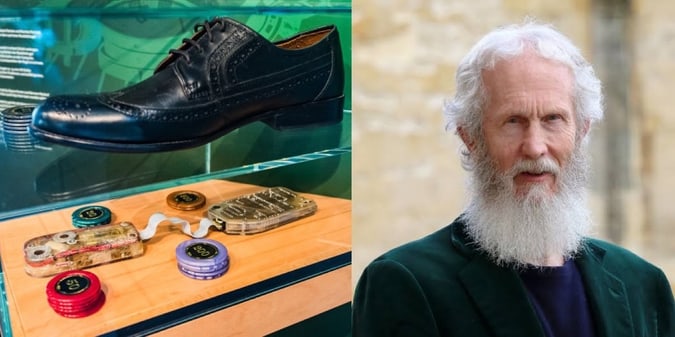Doyne Farmer and his incredible shoe computer. (Image: Oxford Martin School)
In a remarkable tale of ingenuity and science, Doyne Farmer, a physicist and pioneer in chaos theory and complex systems, made headlines in the 1970s by defeating the odds at roulette tables in Las Vegas.
At just 24 years old, Farmer, equipped with the world’s first wearable computer, managed to gain a significant edge over the casino, illustrating how physics can turn seemingly random events into predictable outcomes.
Raised in Silver City, New Mexico, Farmer’s interest in science was piqued by an inspirational physicist Tom Ingerson. When Doyne’s parents left for Peru, they left him with Ingerson. Farmer began his scientific projects with a group of fellow urchins and laid the foundation their future pursuits.
Although he initially delved into theoretical physics and cosmology, his experiences at the roulette table shifted his academic focus to chaotic dynamics—the study of seemingly unpredictable systems.
Farmer went on to predict the economic consequences of the Covid-19 pandemic to within a couple of percent.
He also received a call from Geoff Goldberg when during the making of Jurassic Park. He said that Geoff wanted to know how someone who studied chaos theory spoke. Today Doyne’s work centres on predictions relating to Climate Change and the economy.
Humble Beginnings Beating the House at the Roulette Table
Farmer’s computing journey began in the bustling casinos of Las Vegas, where he and a team of around 30 individuals including Norman Packard came together to apply their understanding of physics to the game of roulette.
Farmer’s calculations provided them with an impressive 20% advantage over the house, allowing them to predict between 6 to 8 numbers on the wheel with considerable accuracy.
This endeavor was far from a solo effort; it involved a sophisticated approach in which one team member would collect crucial data, while another placed the bets discreetly, often with the help of female accomplices who were deemed less likely to raise suspicion.
Utilizing the physics of motion, Farmer and his team analysed the behaviour of the roulette ball—its speed, rotational forces, and subsequent trajectories.
Their wearable computer, which Farmer described as “bigger than a package of cigarettes,” was ingeniously designed, with switches in their shoes to record the ball’s movements, allowing real-time predictions.
However, the innovative setup faced persistent hardware challenges, necessitating extensive repairs that often limited their actual casino time.
Toe Controls and Buzzzers Helped Beat the House
Doyne Farmer’s shoe contained a computer, a toe-operated switch, batteries and a transmitter.
He clocked the motion of the ball, used his toe to feed the data to the computer and sent the result via toe transmission to his buddy Thomas Bass, the player who was standing right next to him and placing the jetons on the gameboard.
The computer identified the octant of the wheel where the ball was likely to land, and Bass placed the bets.
Bass received the signal in his right shoe, which was equipped with a number of vibrators. In addition to the technical functions, the game observer needed to have agile toes and the player needed a sensitive heel.
High Risks Included Kneecapping if Caught
Farmer's success did not come without risk. As their winnings grew, they began to draw "casino heat," or increased scrutiny from the establishments.
Fearing for their safety, especially in an era when stories of gamblers facing violent repercussions including back room beatings and kneecapping were all too common, Farmer and his team decided to halt their operation, prioritizing their well-being over potential profits.
From Predicting the Roulette Wheel to Prediction on Climate Change and Economics
Today, Farmer is the Director of the Complex Economics Programme at the Institute for New Economic Thinking in Oxford, where he applies the principles of complex systems science to pressing global issues, such as climate change.
His revolutionary approach aims to make better predictions about economic behaviours, much as he once did with the roulette wheel, demonstrating that with the right understanding and technology, randomness can indeed be tamed.
Farmer's story serves as a testament to the intersection of science and practical application, reminding us that the laws of physics can sometimes turn the tables—even in the high-stakes world of casino gambling.
Doyne Farmer is a pioneer in the field of complexity science and chaos theory, Professor at the University of Oxford, and Chief Scientist at Macrocosm Inc.
You can listen to the original interview with Doyne Farmer on BBC Radio 4’s The Life Scientific.
Meet The Author
Experience

Most of my career was spent in teaching including at one of the UK’s top private schools. I left London in 2000 and set up home in Wales raising four beautiful children. I enrolled at University where I studied Photography and film and gained a Degree and subsequently a Masters Degree. In 2014 I helped launch a new local newspaper and managed to get front and back page as well as 6 filler pages on a weekly basis. I saw that journalism was changing and was a pioneer of hyperlocal news in Wales. In 2017 I started one of the first 24/7 free independent news sites for Wales. Having taken that to a successful business model I was keen for a new challenge. Joining the company is exciting for me especially as it is a new role in Europe. I am keen to establish myself and help others to do the same.
Read Full BioRelated News








